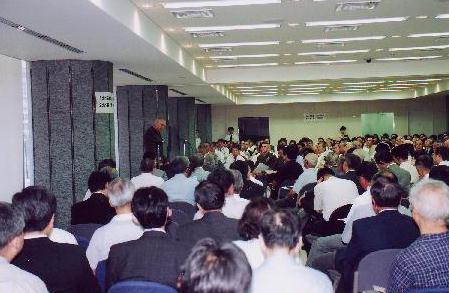About the scale of U.S. presence, it is the 58,000 military personnel, the 5000 U.S. civilian employee, the 25,000 contractors, and the 52,000 families, and amounts to a total of 140,000 people now. This presence does not have complications, either, contributes to the stability of this area, and the stability in the world, and will also continue tackling a future subject with an uncertain terrorism issue etc. until it continues in a past half century and results from the 60s with an eye on the opposite Soviet Union in a move of the latest opposite North Korea. About the Iraq issue, the prompt support of Japan for Allied Forces proves the place where dependability has Japan, and the U.S. appreciates very much. I believe what Japan voted the rightness of Iraq War of releasing Iraq people from a coercion person, and supported it. Furthermore, the fact that Japan also promised financial support is welcomed collectively. Serious works serious remains in Iraq now on. I do not hear that the U.S. expects something from Japan, and Japan judges and wants to act based on a national interest of Japan. We'll also expect the specialized agency of United Nations, and assistance of NGO from now on. An affiliation of the both sides of a military man and a civilian is required for reconstruction after the war. Because the six-nation council has just finished about North Korea issue and it is the midst of diplomatic work now, so I cannot make reference about a military option. We military is supporting diplomatic work 100%. The nuclear in North Korea is a very serious threat. United States has preparation of different assistance from the former and preparation of new related establishment, if North Korea abandons the nuclear by an irreversible means.
After his lecture, the following questions there were.
・Should Japan obtain the nuclear armament?
・Does the United States wish the amendment of Article 9 of Japanese
Constitution?
・When the 2nd Division of U.S.Army deployed in South Korea pulls back, is there
any option which comes to Japan?
・When the nonaggression pact with North Korea are concluded, what kind of
reaction comes out?
・Possibility of decentralization of U.S. Forces centralizedly deployed in Okinawa
to Japanese mainland?
・Future of military cooperation with Japan and the United States?
When considering a future Japan-U.S. security relationship, He personally thinks that the world has changed in this 2 years. They are the date of dramatic diversification, the date which cannot be predicted, and the date of the threat which cannot be predicted newly today. Therefore, it said that he thinks that it must evolve into the supple Japan-U.S. alliance relationship which can respond to all areas, and the lecture was rounded off from now on. (Reported by secretariat Nakatsukasa)
